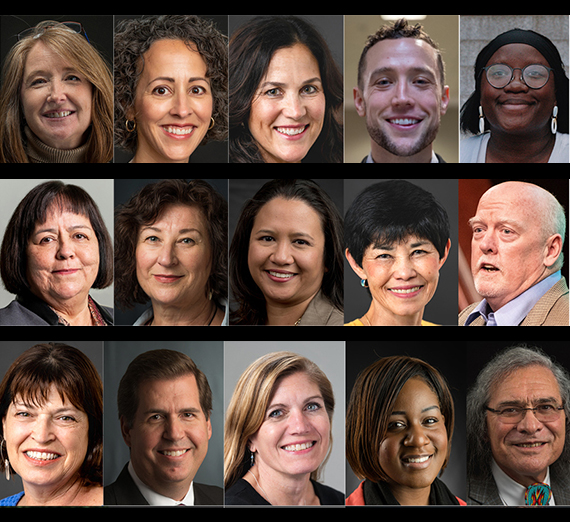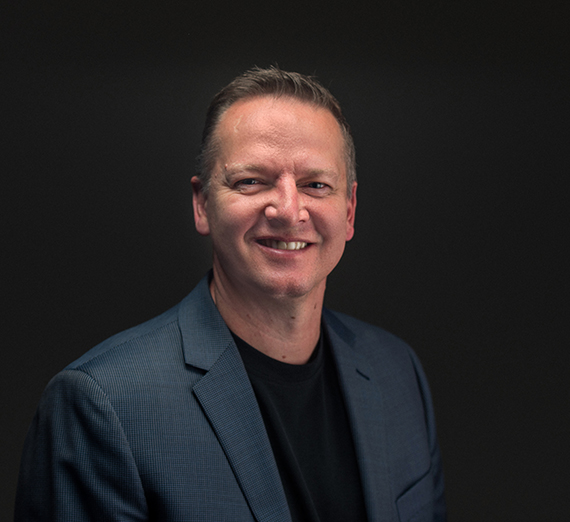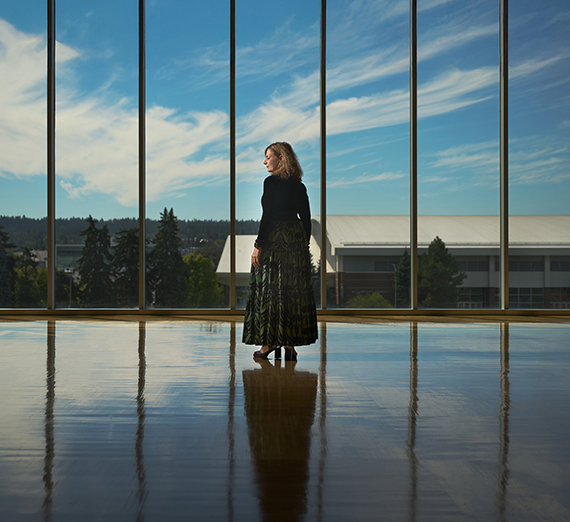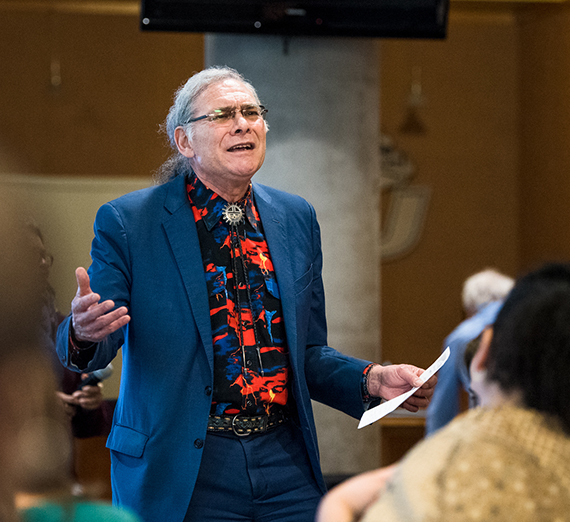Big Spirit, Wise Soul
Raymond Reyes retires after 36 years
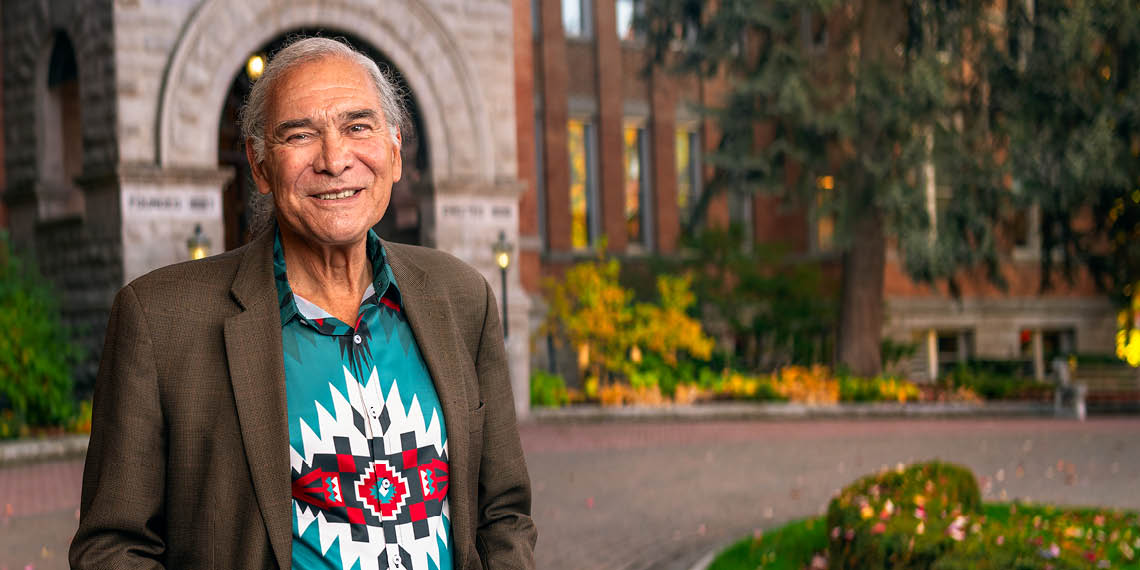
I saw his tall, lean, stately figure under a tree, watching and listening as students and faculty raised awareness about an important social topic. He was “bearing witness,” he told me. It’s something Raymond Reyes has done dozens of times for a variety of causes in a wide array of settings, standing quietly in the shadows to show his interest without putting the spotlight on himself.
But there have been times – too many to count – when Reyes had to be in the forefront as the voice of Gonzaga when campus members rallied to plead for greater response to people on the margins, in the fray. That’s a foreboding role to play, but Reyes has exuded grace, embracing the tension so often necessary to create positive change.
Over 36 years at Gonzaga as director of this and chief of that (see page 30), Reyes’ best work has been as student of humanity. It’s the human experience – cycles of growth and rebirth, and encounters with the Divine – that keep this wise septuagenarian engaged with his community and perpetually seeking ways to improve this shared experience of life.
There is no way any one individual could adequately describe his beloved and esoteric communications, his demeanor in times of turmoil, or the nature of his presence. Fortunately, many campus and community members were eager to help.
Campus Voices
“Raymond Reyes is a good man. Gonzaga will be diminished when he says goodbye,” writes Blaine Garvin, professor of political science. “There is something sweet and innocentabout Raymond. He has never lost touch with the possibility of goodness.”
Garvin continues: “Over the years Raymond has worked to help the rest of us see the light, to appreciate the surprising openings our lives put in front of us. Doors that lead to understanding and appreciation. ... We should listen to Raymond, who understands that we creative human beings have found a thousand ways through the thickets of our lives, paths that lead toward the good and the holy.”
Having served as GU’s first chief diversity officer, Reyes invested himself in the long, slow work of improving intercultural awareness on campus and a deeper sense of place for students who traditionally found themselves on the margins.
He would say things such as:
His poetic expressions are gems held closely by all who have shared their reflections.
“There is this infectious passion whenever Raymond is in front of a class or a group of any kind, words and images that just flow so easily and pick up such momentum over time that you have to listen to see how things are going to end,” says Chuck Murphy, chief strategy officer.
Matt Lamsma, dean for student development, recalls the particular way Raymond described the work of equity and inclusion as attempting to bridge the gap between rhetoric and reality. “I always appreciated that phrase as a much more eloquent way of saying we need to put our money, time, energy and resources where our mouth is,” Lamsma says.
Joan Iva Fawcett, dean for social justice leadership and community empowerment, adds: “Raymond always managed to leave every audience mesmerized by his powerful and poetic messages. He often started his talks by having everyone look at their thumbprint as a way to remind us that we’re the only person in this entire universe in the whole history of humankind who has this fingerprint. That’s how unique and valuable each of us is.”
This gift for uniting people in the experience of being human has been a longstanding benefit to so many.
“Raymond is one of those rare people who, on a minute’s notice, can speak from his heart, with a deep reservoir of knowledge and vast experience,” adds Kent Porterfield, vice provost for student affairs. “He is a gentle soul with a caring presence, always calling people ‘in’ rather than calling people ‘out.’ He has a deep understanding of Ignatian values and pedagogy, and his love for Gonzaga comes across in every conversation you have with him. I honestly believe that Raymond’s deepest desire is for every faculty, staff and student at Gonzaga to be seen, heard and valued.”
Julie McCulloh, vice provost for enrollment management, recalls being a student worker for campus catering, and being particularly grumpy about working an event on a beautiful summer afternoon. But the person in charge of the event, Raymond, helped her shift her perspective.
“I witnessed this gifted person engage a room full of people with stories, and I was in awe at recognizing I was witnessing someone special,” McCulloh shares. More than 30 years later, she still invites Raymond to speak to hundreds of prospective students during GEL Weekend, “because he is so genuinely joyful and invites students to let go, open up and see goodness.”
Fellow Professor Linda Tredennick (English and honors) says: “Raymond was more than just a model for how to be a loving, loyal advocate for change – he taught me a whole new way to think about who I want to be as a Gonzaga professor and as a person in the world. And he did so with grace, humor, humility and wisdom.”

A colleague of Reyes in the School of Education, Deborah Nieding, writes: “Raymond’s enthusiasm for teaching, his work in all areas and life in general, has always been inspiring.” Some of her fondest memories are of accompanying teacher education students to Zambia to work with African students and staff at a community college, where Raymond was great at establishing strong relationships and a real sense of family.
“Raymond’s nickname was Rainman and I frequently referred to him in that way," Nieding continues. “One of the African students asked me if he really could make it rain and I said, ‘Yes, and the rain is wisdom’. ”
Jason Varnado, director of disability access, writes: "The first time I met Raymond was at new employee orientation in 2007 (back when he had his braids). The only thing I remember from that day was his session. He was engaging and fun, and as he ended his session, he began to walk out of the meeting, waved to the room and said: 'Now I have mind-melded with you all, and you know what I know!'
"That set the tone for how I saw Raymond over the years: No matter how heavy, difficult or frustrating a situation, he could always find the light (and when appropriate, humor) within him to shine through. I have seen him frustrated, even angry, at injustice and I have always been inspired by how he could morph that frustration into action and drive toward the positive."
Vernado continues: “I am a better person for having known him and learned from him.”
Community Echos
As a founding member of the Gonzaga Institute for Hate Studies (now the Center for the Study of Hate), Raymond has worked closely with several community task forces on race relations. Director of the Kootenai County Task Force on Human Relations, Tony Stewart, finds Reyes to be “a dear friend and colleague in the campaign for civil and human rights, diversity, inclusion, equity and social justice. He is truly a giant in the advancement of democracy through his work not only in the United States but also internationally.”
Stewart continues, “Raymond’s eloquent speaking and writing have persuaded many individuals to join the cause to assist and support those among us who experience discrimination and injustices.”
Mary Stamp, former editor of local publication The Fig Tree, first met Raymond when he was working with the American Indian Community Center. “I have valued the depth of the insights he brings to issues,” she says. “We have had some vital conversations about multicultural, multifaith, multiracial, multigenerational ties.”
“Raymond is one of the most compassionate, thoughtful and committed educators I have had the honor to work with,” says Erin Jones, education consultant. “Raymond has given so much: He has left a legacy that is embedded in the lives of thousands, some for whom he is not even aware.”
Moving Ahead
It’s possible that no other educator at Gonzaga in the last few decades has had higher hopes for the potential of this university than Raymond, although the work of continual improvement has always required a community of likeminded people in partnership. As he leaves his office keys behind and enjoys life without a rigorous schedule, it will be up to all whom he inspired to infuse energy and focus for Gonzaga to do its greatest good.
“I want Raymond to know that the Gonzaga that always existed in his heart (and sometimes only in his heart) lives on in my work,” says Tredennick, “and I will do all that I can to pass that vision on to the faculty and students I have the privilege to mentor.”
That’s the way Raymond would want us to carry on.
And he’d add:
“In the spirit of our ancestors, may the blessings be.”
- Faculty Voices
- Faith & Mission
- Diversity & Inclusion
- School of Education
- Institute for Hate Studies
- Center for Global Engagement
- Gonzaga Magazine



